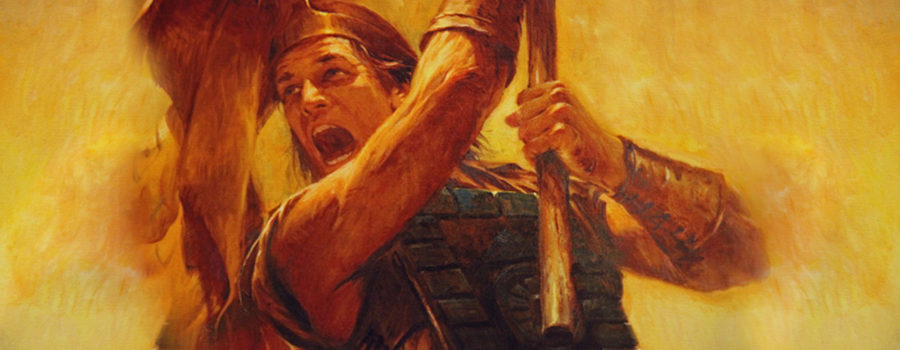In the Stick of Joseph, we encounter a time of crisis at which the freedom and liberty of the people hangs in the balance. At this crucial moment, Captain M’roni raises the Title of Liberty, written on a torn piece of his garment, and goes among the people calling them to arms in defense of their liberty. In response, people rush forward and make a vow to obey the commandments of YHWH and fight for freedom:
And when M’roni had said these words, he went forth among the people, waving the torn piece of his garment in the air, that all might see the writing which he had written upon the torn piece, and crying with a loud voice, saying, Behold, whosoever will maintain this title upon the land, let them come forth in the strength of YHWH and enter into a covenant that they will maintain their rights and their religion, that Adonai YHWH may bless them!
And it came to pass that when M’roni had proclaimed these words, behold, the people came running together, with their armors girded about their loins, tearing their garments in token, or as a covenant, that they would not abandon YHWH their Elohim; or in other words, if they should transgress the mitzvot of Elohim, or fall into transgression and be ashamed to take upon them the name of Mashiach, YHWH should tear them even as they had torn their garments. Now this was the covenant which they made, and they cast their garments at the feet of M’roni, saying, We covenant with our Elohim that we shall be destroyed, even as our brothers in the land northward, if we shall fall into transgression; yes, he may cast us at the feet of our enemies even as we have cast our garments at your feet, to be trampled underfoot, if we should fall into transgression.
(Alma 21:8-9)
This covenant made by the people is an example of a vow or oath made by way of a euphemism or analogy. Within Jewish law, there are two ways a person might make a vow. The first is direct, stating the terms forthrightly. For example, “this item shall be prohibited to me” is a direct statement of vow terms.
However the vow might also be made by a euphemism, stating by analogy the terms of the vow. As we read in the Talmud:
All euphemisms [used to express vows] are equivalent to vows…[and] for oaths are equivalent to oaths
(m.Nedarim 1:9; b.Nedarim 2a)
The Talmud gives an example of this:
For example, “[if he said, ‘…may it be to me] like the lamb [of the daily whole-offering]…’”
(m.Nedarim 1:3; b.Nedarim 10b)
In the example above, the vow is made using the sacrificial lamb as an analogy. Of course, for such a vow to be valid in Jewish law, an analogy must exist.
One could make a vow and say “this bread is Kodesh” (property of the Temple and Priesthood). And one could then say “this chicken shall be to me like this bread” which would also designate the chicken as kodesh by way of analogy.
As we read in the Mishnah:
If he said “[May it be to me] like the lamb [offering], Like the [Temple] sheds,” “Like the wood,” “Like the fire,” “Like the altar,” “Like the sanctuary,” “Like Jerusalem.”– If he vowed by the name of one of any of the utensils used for the altar, Even though he has not used the word korban– lo, this one has vowed by korban.
(m.Nedarim 1:1-4)
On the other hand, if one vows by analogy using an object that one cannot affect by a vow, the vow is non-binding. For example, if one were to say “this chicken is to me as this pig” it would not be binding because the pig was forbidden by a commandment of Elohim, and not through a vow. One cannot make the pig forbidden by a vow, so one cannot make an analogy to it. Since there is no analogy, the vow is non-binding as to the chicken. As we read in the Mishnah:
And these [vows] are not binding [at all]:
[He who says,] May what I eat of yours be unconsecrated food,”
“[Be] like pig meat,”
“Like an idol,” “Like hides pierced at the heart,”
“Like carrion.” “Like terefah meat,”
“Like abominations.” “Like creeping things,””Like the dough offering of Aaron,” or “Like his heave offering,”–it is not binding.
(m.Nedarim 2:1)
Moreover if one were to say “this chicken is to me like Jerusalem” the vow would not be binding because Jerusalem was designated as holy by YHWH and not by any vow of man. As we read in the Mishnah:
Rabbi Judah says, “He who says, “Jerusalem,” has said nothing [that is a vow]. (m.Nedarim 1:3).
In Alma 21:9 (above) the people made a valid vow by analogy when they tore their garments and cast them at M’roni’s feet. It was therefore binding under Jewish law, because the analogy was valid. Their vow could be expressed in Rabbinic language as “If we shall fall into transgression may we be even as these garments.”
These Nefites made vow by way of analogy, exactly in accordance with Jewish law as laid out in the Mishnah and Talmud, testifying once again to the fact that the Stick of Joseph is, after all, a Jewish book.






Leave a Reply